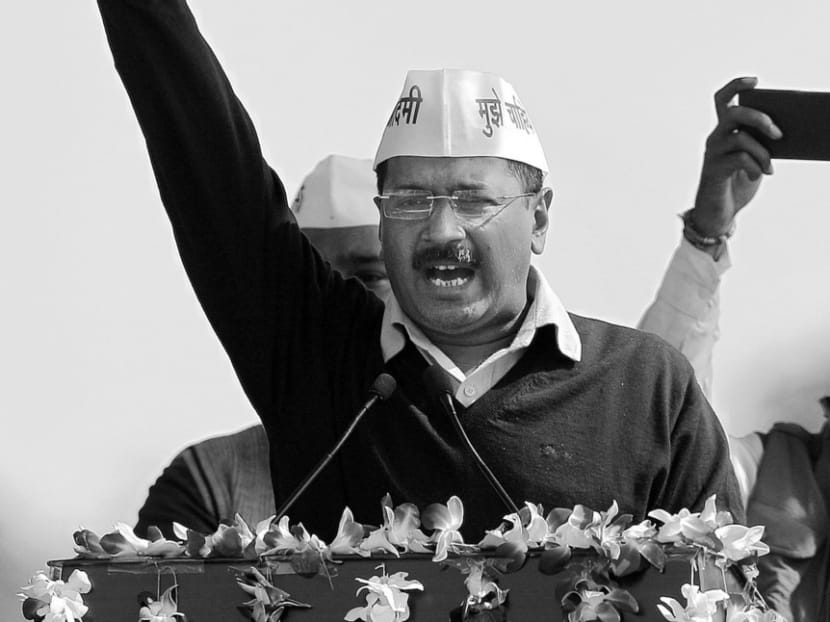What India’s upstart can teach Jokowi
The politics of India, like those of Indonesia, are unpredictable. Mr Arvind Kejriwal, the founder of the Aam Aadmi (Common Man) Party, was recently elected Chief Minister of Delhi. His comeback is surprising, given his failure last year in challenging the Bharatiya Janata Party’s (BJP) prime ministerial candidate Narendra Modi in the general election.

No doubt, Mr Widodo would envy Mr Kejriwal’s (picture) position as head of his own political party. Photo: AP
The politics of India, like those of Indonesia, are unpredictable. Mr Arvind Kejriwal, the founder of the Aam Aadmi (Common Man) Party, was recently elected Chief Minister of Delhi. His comeback is surprising, given his failure last year in challenging the Bharatiya Janata Party’s (BJP) prime ministerial candidate Narendra Modi in the general election.
Mr Kejriwal is the Indian political figure most similar to Indonesian President Joko “Jokowi” Widodo. Both men have sought to represent the interests of the grassroots populations of their respective countries. They have also been accused of being foreign stooges. Both are popular on social media, with the former becoming the fifth-most-mentioned Indian politician on both Twitter and Facebook during his Delhi Legislative Assembly campaign in 2013.
The central theme of Mr Kejriwal’s political career has been his pledge to root out corruption in Indian politics. In fact, it was his involvement in the 2011 Jan Lokpal movement that brought him to public attention for the first time. The movement demanded that the Indian government pass a parliamentary Bill to strengthen the fight against corruption through the formation of a public ombudsman office with powers to prosecute officials suspected of graft. The new body would be akin to Indonesia’s own Corruption Eradication Commission (KPK).
By the same token, Mr Widodo also promised to fortify Indonesia’s anti-graft measures during his presidential campaign. He even pledged a 10-fold increase in the KPK’s budget to expedite matters. His previous track records as both Mayor of Solo and Governor of Jakarta, during which he attempted to simplify bureaucracy to cut corruption, seemed promising.
Hence, with the obvious attempts by the National Police to cripple the KPK after the latter named his candidate for police chief a graft suspect, the President’s inaction was astounding.
This is perhaps where he and Mr Kejriwal differ.
OWNING THE POLITICAL PARTY
It may be too early to ascertain the Indian leader’s commitment to fighting corruption as he has just assumed office. But at the very least, he did resign as Chief Minister in 2013 because his minority government failed to pass an anti-corruption Bill.
In terms of deed, Mr Kejriwal has shown more courage than Mr Widodo in staying true to his principles. The former’s resignation after a mere 49 days in office was an indication that he would not bow to the forces of compromise and horse trading by his coalition partners when it came to an integral theme of his vision of a corruption-free India.
Another difference between the two men is that while Mr Widodo has attained the highest political office in Indonesia, Mr Kejriwal has so far managed to secure “only” the chief ministership of Delhi, a position comparable to Mr Widodo’s previous post as Governor of Jakarta.
But the most important distinguishing feature between the two is that the Indian leader has one asset that the South-east Asian head of state has never had: His own political party, the AAP. The party will without a doubt prove instrumental if he chooses to have another attempt at the prime ministership in the future.
This difference is important. Despite adhering to a presidential Cabinet, Indonesian Presidents tend to be better served when they have their own political parties, as Mr Widodo’s predecessor Susilo Bambang Yudhoyono proved.
The current police-versus-KPK crisis also suggests that the leader might have a freer scope of action if he were in full control of his parliamentary coalition. The closeness of police chief candidate Budi Gunawan to the President’s main political backer, Ms Megawati Sukarnoputri, chairwoman of the Indonesian Democratic Party of Struggle (PDI-P), would undoubtedly have presented Mr Widodo with a predicament if he had refused to nominate Mr Gunawan.
The problematic situation then became a mine trap when the House of Representatives, known for its uncooperativeness with the President, rushed to approve Mr Gunawan’s candidacy. Later on, a number of lawmakers said the House would impeach the President if he dared cancel the appointment.
For a leader without any majority in the legislature and no direct access to control the political parties in his coalition, such as Mr Widodo, the going can only get tougher. He may not have heard of Mr Kejriwal at all, but no doubt he would envy his position as head of his own political party.
Between the two men, one thing remains highly ironic. While Mr Kejriwal spent years campaigning for the formation of India’s version of the KPK, Mr Widodo today seems to be willing to see the KPK seriously embattled, while all he has to do is empower it. Let us hope history will record that both men remained consistent in their efforts to fight corruption both in Indonesia and India. JAKARTA GLOBE
ABOUT THE AUTHOR:
Johannes Nugroho is a writer and businessman from Surabaya.






